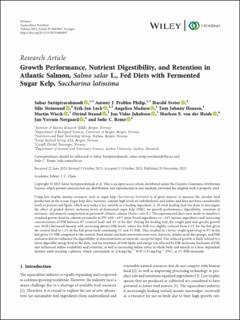| dc.contributor.author | Sartipiyarahmadi, Sahar | |
| dc.contributor.author | Philip, Antony Jesu Prabhu | |
| dc.contributor.author | Sveier, Harald | |
| dc.contributor.author | Steinsund, Silje | |
| dc.contributor.author | Lock, Erik Jan Robert | |
| dc.contributor.author | Madaro, Angelico | |
| dc.contributor.author | Hansen, Tom Johnny | |
| dc.contributor.author | Wiech, Martin | |
| dc.contributor.author | Strand, Øivind | |
| dc.contributor.author | Jakobsen, Jan Vidar | |
| dc.contributor.author | Van Der Heide, Marleen E. | |
| dc.contributor.author | Nørgaard, Jan Værum | |
| dc.contributor.author | Remø, Sofie C. | |
| dc.date.accessioned | 2024-01-09T07:50:14Z | |
| dc.date.available | 2024-01-09T07:50:14Z | |
| dc.date.created | 2024-01-03T12:56:53Z | |
| dc.date.issued | 2023 | |
| dc.identifier.citation | Aquaculture Nutrition. 2023, 2023 1-18. | en_US |
| dc.identifier.issn | 1353-5773 | |
| dc.identifier.uri | https://hdl.handle.net/11250/3110485 | |
| dc.description.abstract | Using low trophic marine resources such as sugar kelp (Saccharina latissimi) is of great interest to increase the circular food production in the ocean. Sugar kelp does, however, contain high levels of carbohydrates and iodine and does not have considerable levels of protein and lipids, which may make it less suitable as a feeding ingredient. A 10-week feeding trial was done to investigate the effect of graded dietary inclusion levels of fermented sugar kelp (FSK), on growth performance, digestibility, retention of nutrients, and mineral composition in postsmolt Atlantic salmon (Salmo salar L.). The experimental diets were made to simulate a standard grower feed for salmon postsmolts in SW with ∼63% plant-based ingredients vs ∼34% marine ingredients and increasing concentrations of FSK between 0% (control feed) and 4% of the diet. During the feeding trial, the weight gain and specific growth rate (SGR) decreased linearly with increasing dietary FSK levels, where the SGR was slightly reduced from 1.2% for the fish given the control feed to 1.1% in the fish given feeds containing 3% and 4% FSK. This resulted in a lower weight gain of up to 9% in the fish given 4% FSK compared to the control. Feed intake and feed conversion ratio were, however, similar in all diet groups, and FSK inclusion did not influence the digestibility of macronutrients or minerals, except for lipid. The reduced growth is likely related to a lower digestible energy level in the diets, and the retention of both lipids and energy was affected by FSK inclusion. Inclusion of FSK also influenced iodine availability and retention, as well as increasing iodine status in whole body and muscle in a dose-dependent manner until reaching a plateau, which corresponds to 124 mg I kg−1 WW (135 mg I kg−1 DW), at 3% FSK inclusion. | en_US |
| dc.language.iso | eng | en_US |
| dc.title | Growth Performance, Nutrient Digestibility, and Retention in Atlantic Salmon, Salmo salar L., Fed Diets with Fermented Sugar Kelp, Saccharina latissima | en_US |
| dc.title.alternative | Growth Performance, Nutrient Digestibility, and Retention in Atlantic Salmon, Salmo salar L., Fed Diets with Fermented Sugar Kelp, Saccharina latissima | en_US |
| dc.type | Peer reviewed | en_US |
| dc.type | Journal article | en_US |
| dc.description.version | publishedVersion | en_US |
| dc.source.pagenumber | 1-18 | en_US |
| dc.source.volume | 2023 | en_US |
| dc.source.journal | Aquaculture Nutrition | en_US |
| dc.identifier.doi | 10.1155/2023/6664947 | |
| dc.identifier.cristin | 2219874 | |
| cristin.ispublished | true | |
| cristin.fulltext | original | |
| cristin.qualitycode | 1 | |
